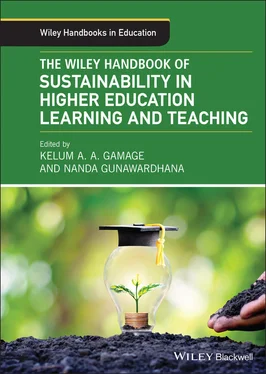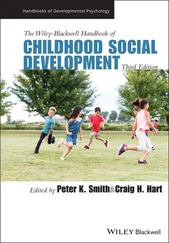The University of Michigan's President, Mary Sue Coleman, emphasizes the crucial role of an environmental focus in adopting sustainability concepts in the university operations and thus acknowledges the urgency of addressing environmental sustainability:
The pressing challenge of environmental sustainability is a huge global concern… From teaching and research, to hand on engagement, we are going to leverage our many strengths to make significant contributions to an urgent and extraordinarily complex problem.
(University of Michigan News, 2009)
A question may arise as to why ESD is urgent. The answer is that the urgency is felt so greatly because of the increasing number of global issues and the incapacity of former and current generations in managing these complex issues. Sustainability is not a destination, rather it is an ever‐continuing state of events that needs to be maintained at the pace of social transformation. The reason why ESD, like other sustainability goals, has failed in its implementation is due to a number of barriers that impede this ongoing sustainability journey.
1 Brundtland Report (1987). Report of the world commission on environment and development: our common future. https://sustainabledevelopment.un.org/content/documents/5987our‐common‐future.pdf(accessed 24 November 2021).
2 Dovers, S. (2005). Environment and Sustainability Policy: Creation, Implementation and Evaluation. Sydney, NSW: Federation Press.
3 Dvořáková, L. and Zborková, J. (2014). Integration of Sustainable Development at Enterprise Level. doi: https://doi.org/10.1016/j.proeng.2014.03.043
4 Garcia, J., da Silva, S.A., Carvalho, A.S., and de Andrade Guerra, J.B.S.O. (2017). Education for sustainable development and its role in the promotion of the sustainable development goals. In: Curricula for Sustainability in Higher Education, 1e (ed. J.P. Davim), 1–18. Cham, Switzerland: Springer.
5 Harvard University Sustainability Plan (n.d.). Cambridge, MA: Harvard Office for Sustainability. https://green.harvard.edu/sites/green.harvard.edu/files/Harvard%20Sustainability%20Plan‐Web.pdf.
6 Heiss, J. (2021). The role of higher education in sustainability science for implementing the SDGs. UNESCO. https://en.unesco.org/sites/default/files/panel_3_presentation_juliaheiss.pdf(accessed 16 July 2021).
7 Hopkins, C. and McKeown, R.. (2005). Guidelines and recommendations for reorienting teacher education (Technical Paper No. 2), 13. Paris: UNESCO. http://unesdoc.unesco.org/images/0014/001433/143370e.pdf(accessed 24 November 2021).
8 Kagawa, F. (2007). Dissonance in students' perceptions of sustainable development and sustainability: implications for curriculum change. International Journal of Sustainability in Higher Education 8 (3): 317–338.
9 Kioupi, V. and Voulvoulis, N. (2019). Education for sustainable development: a systemic framework for connecting the SDGs to educational outcomes. Sustainability 11 (21): 6104. https://doi.org/10.3390/su11216104.
10 Kohlstedt, S.G. (1997). Nature study in North America and Australasia, 1890–1945: International connections and local implementations. Historical Records of Australian Science 11 (3): 439–454.
11 McKeown, R. (2002). ESD toolkit version 2. 1–142. http://www.esdtoolkit.org/esd_toolkit_v2.pdf(accessed 29 October 2019).
12 Orr, D.W. (1991). What is education for? Six myths about the foundations of modern education, and six new principles to replace them. In: Earth in Mind: On Education, Environment, and the Human Prospect. Island Press http://nsdl.library.cornell.edu/websites/comm/uploads/David_Orr.pdf.
13 Orr, D.W. (1992). Ecological Literacy: Education and the Transition to a Postmodern World. Albany, NY: State University of New York Press.
14 Pavlova, M. (2012). Environmental education and/or education for sustainable development: what role for technology education? https://research‐repository.griffith.edu.au/bitstream/handle/10072/46566/74769_1.pdf?sequence=1&isAllowed=y(accessed 23 May 2021).
15 Rio+20 People's Sustainability Treaty on Higher Education. (n.d.). Copernicus Alliance. https://www.copernicus‐alliance.org/images/Documents/treaty_rio.pdf.
16 Scott, W. (2015). Education for sustainable development (ESD): a critical review of concept, potential and risk. In: Schooling for Sustainable Development in Europe: Concepts, Policies and Educational Experiences at the End of the UN Decade of Education for Sustainable Development (ed. R. Jucker and R. Mathar), 47–70. Cham, Switzerland: Springer International Publishing.
17 Seatter, C.S. and Ceulemans, K. (2017). Teaching sustainability in higher education: Pedagogical styles that make a difference. The Canadian Journal of Higher Education 47: 47–70. https://eric.ed.gov/?id=EJ1154160.
18 Sherren, K. (2008). A history of the future of higher education for sustainable development. Environmental Education Research 2008 (14): 238–256.
19 Sustainability Goals (2021). University of Michigan ‐ Office of Campus Sustainability, University of Michigan, 27 Jan. 2021, Available online: ocs.umich.edu/sustainability‐goals/. (Accessed on 10 February 2021).
20 Tilbury, D. and Wortman, D. (2004). Engaging people in sustainability. Gland, Switzerland and Cambridge, UK: Commission on Education and Communication https://portals.iucn.org/library/efiles/documents/2004‐055.pdf.
21 UNESCO (2009). Climate change and environmental education. A Companion to the Child‐Friendly Schools Manual. https://s25924.pcdn.co/wp‐content/uploads/2017/11/CFS_Climate_E_web‐1.pdf(accessed 15 October 2021).
22 UNESCO (2012). Shaping the Education of Tomorrow: 2012 Report on the UN Decade of Education for Sustainable Development (abridged), 89. Paris, France: UNESCO. https://library.wur.nl/WebQuery/wurpubs/fulltext/246667.
23 UNESCO (2014). Global Monitoring Report 2013/4: Teaching and Learning: Achieving Quality for All. Paris, France: UNESCO https://en.unesco.org/gem‐report/report/2014/teaching‐and‐learning‐achieving‐quality‐all.
24 UNESCO (2017). Education for Sustainable Development Goals: learning objectives. http://unesdoc.unesco.org/images/0024/002474/247444e.pdf(accessed 24 November 2021).
25 University of Michigan News (2009). President Coleman launches multifaceted sustainability initiative. https://news.umich.edu/president‐coleman‐launches‐multifaceted‐sustainability‐initiative(accessed 18 February 2021).
26 Venkataraman, B. (2009). Education for sustainable development. Environmentalist Magazine 51 (2): 8–10.
Part I Transforming the Curriculum – Pedagogy Focused Initiatives
2 Activist Learning for Sustainability: A Pedagogy for Change
Zoe Robinson, Rebecca Laycock Pedersen, and Sarah Briggs
2.1 Introduction
2.1.1 Education for Sustainability in Higher Education
There is increasing acknowledgment of the responsibility of universities in contributing to a more sustainable future, and our role as educators in ensuring our students have the agency to enact change (Robinson 2019). The responsibility of universities goes beyond the traditional estates‐based environmental management focus toward a more holistic understanding of the ways in which universities can contribute to sustainability, through their engagement and outreach with local communities, their research activities, as well as their educational mission. Education can be a thread which weaves these areas of responsibility together.
These potential contributions to sustainability by universities cross the breadth of interconnected and interdependent environmental, social and economic issues that embody our understanding of “sustainability” (Gibson 2006; Purvis et al. 2019). The United Nations Sustainable Development Goals (SDGs), ratified in 2015, comprise 17 goals and 169 targets and, although not without criticism (Adelman 2018; Liverman 2018), might represent the best blueprint we have for a more sustainable future. These models of interconnected issues highlight that sustainability challenges are complex “wicked problems” which can be time‐consuming and difficult to address due to involving multiple stakeholders, dimensions and conflicting needs (Ackoff 1974; Waddock 2013) and therefore need holistic and systemic approaches.
Читать дальше












